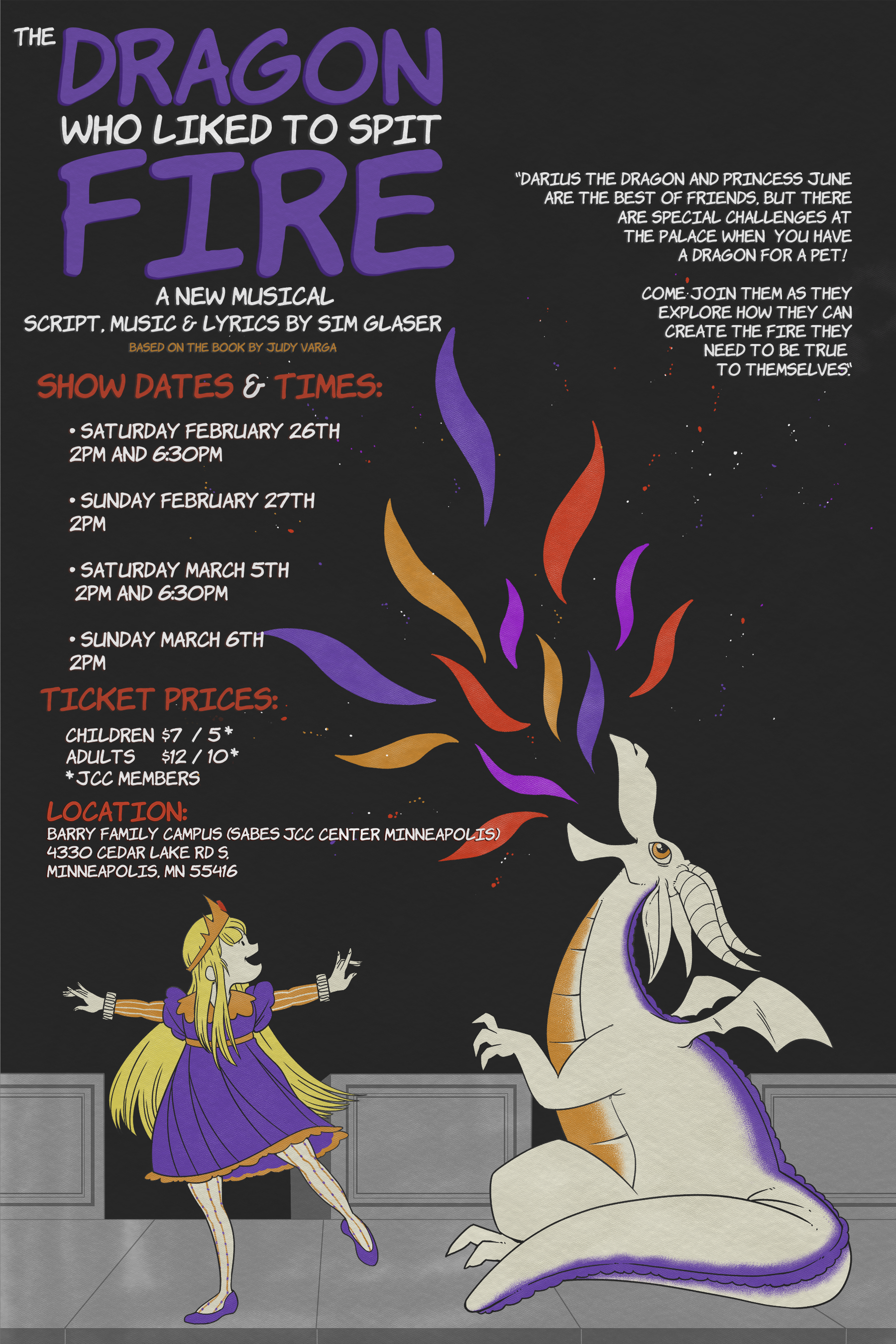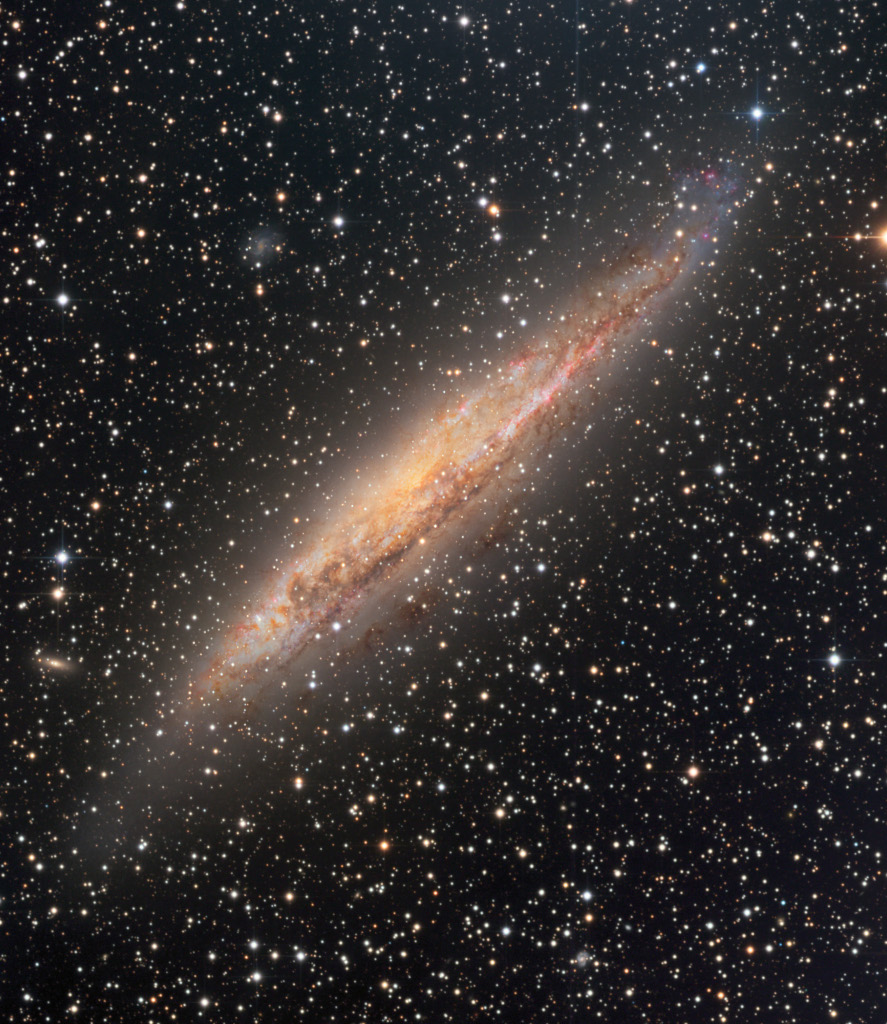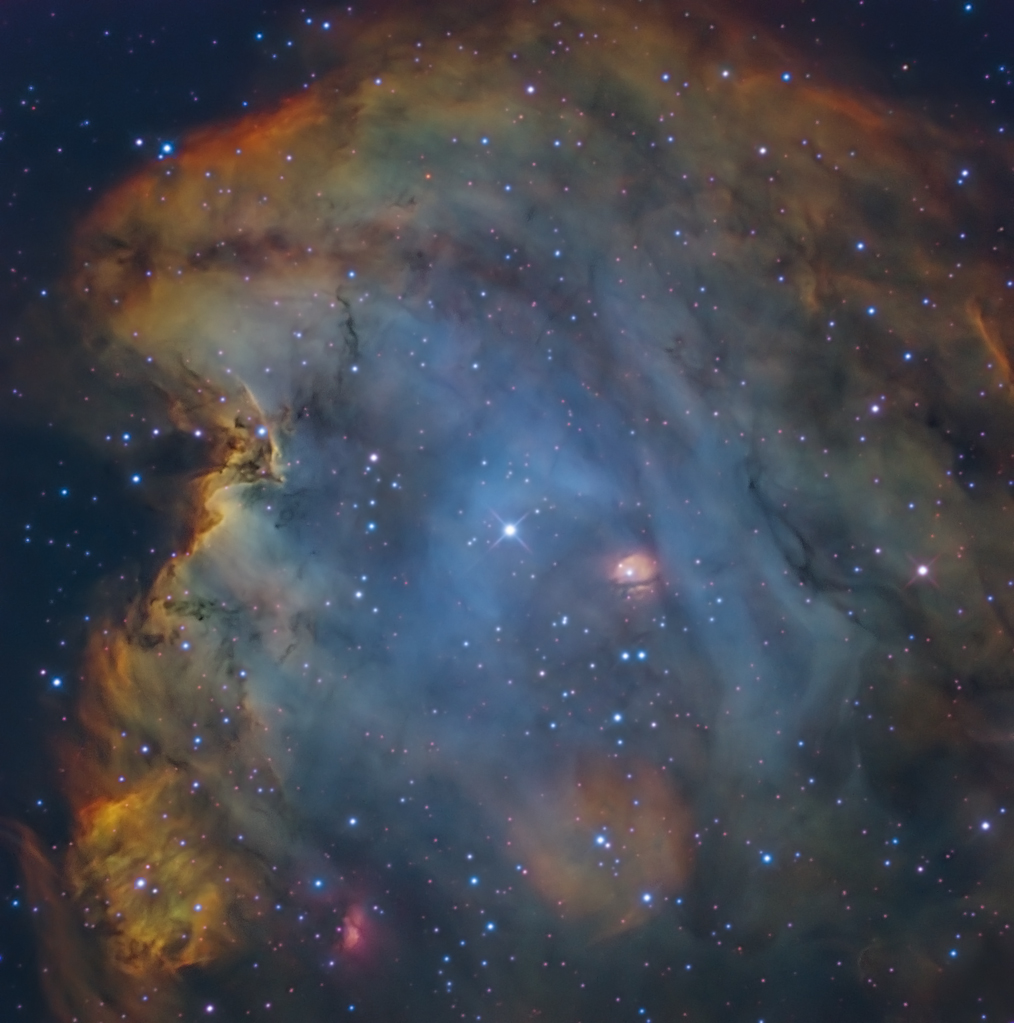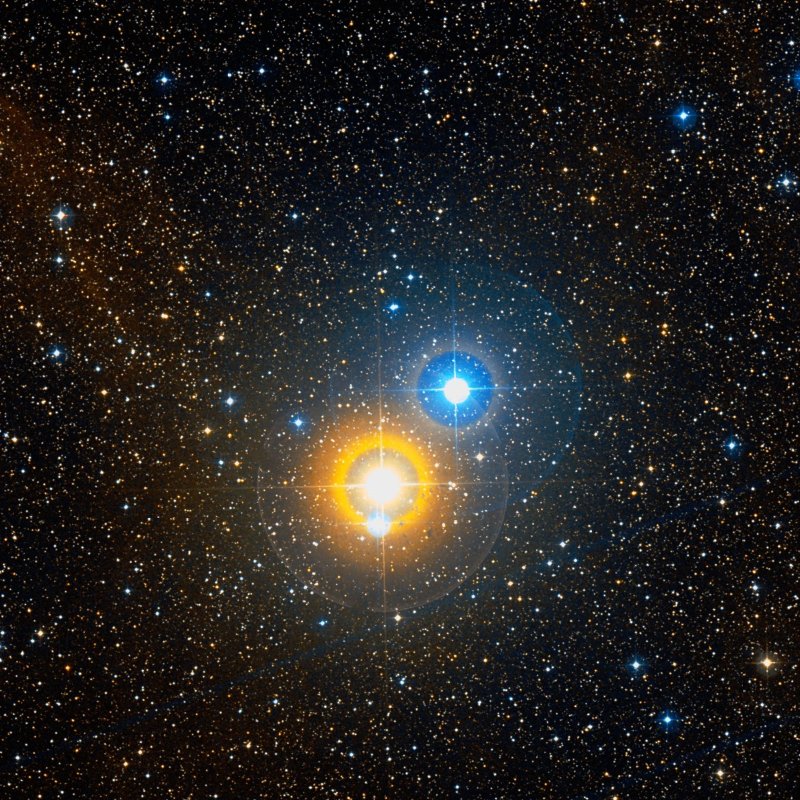Blog
Based on the children’s book of Judy Varga. Play and Music created by Temple Israels Sim Glaser. Opening today at 2pm with an additional 630pm performance. Music with Todd Russell, Riley Helgeson, Mark Yannie, Tom Lewis and mick laBriola. Running through March 6th.

Large spiral galaxy NGC 4945 is seen nearly edge-on in this cosmic galaxy close-up. It’s almost the size of our Milky Way Galaxy. NGC 4945’s own dusty disk, young blue star clusters, and pink star forming regions stand out in the colorful telescopic frame. About 13 million light-years distant toward the expansive southern constellation Centaurus, NGC 4945 is only about six times farther away than Andromeda, the nearest large spiral galaxy to the Milky Way. Though this galaxy’s central region is largely hidden from view for optical telescopes, X-ray and infrared observations indicate significant high energy emission and star formation in the core of NGC 4945. Its obscured but active nucleus qualifies the gorgeous island universe as a Seyfert galaxy and home to a central supermassive black hole.

Mitch Ryder (born William Sherille Levise, Jr.; February 26, 1945) is an American musician who has recorded more than 25 albums over more than four decades.
Ryder formed his first band, Tempest, when he was at Warren High School, and the group gained some notice playing at a Detroit soul music club called The Village. Ryder next appeared fronting a band named Billy Lee & The Rivieras, which had limited success until they met songwriter / record producer Bob Crewe. Crewe renamed the group Mitch Ryder & The Detroit Wheels, and they recorded several hit records for his DynoVoice Records and New Voice labels in the mid to late 1960s, most notably 1964’s “Devil with a Blue Dress On“, their highest-charting single at number four, as well as “Jenny Take a Ride!”, which reached number 10 in 1965, and “Sock It to Me, Baby!”, a number six hit in 1967. The Detroit Wheels were John Badanjek on drums, Mark Manko on lead guitar, Joe Kubert (not to be confused with the comic book illustrator Joe Kubert) on rhythm guitar, Jim McCarty (not to be confused with the Yardbirds drummer of the same name) on lead guitar and Jim McAllister on bass.
more...John R. Cash (born J. R. Cash; February 26, 1932 – September 12, 2003 Kingsland, AK) was an American singer, songwriter, musician, and actor. Much of Cash’s music contained themes of sorrow, moral tribulation, and redemption, especially in the later stages of his career. He was known for his deep, calm bass-baritone voice, the distinctive sound of his Tennessee Three backing band characterized by train-like chugging guitar rhythms, a rebelliousness coupled with an increasingly somber and humble demeanor, free prison concerts, and a trademark all-black stage wardrobe which earned him the nickname “The Man in Black“.
Born to poor cotton farmers in Kingsland, Arkansas, Cash rose to fame in the burgeoning rockabilly scene in Memphis, Tennessee, after four years in the Air Force. He traditionally began his concerts by simply introducing himself, “Hello, I’m Johnny Cash”,[c] followed by “Folsom Prison Blues“, one of his signature songs. Alongside “Folsom Prison Blues”, his other signature songs include “I Walk the Line“, “Ring of Fire“, “Get Rhythm“, and “Man in Black“. He also recorded humorous numbers like “One Piece at a Time” and “A Boy Named Sue“, a duet with his future wife June called “Jackson” (followed by many further duets after their wedding), and railroad songs such as “Hey, Porter“, “Orange Blossom Special“, and “Rock Island Line“.During the last stage of his career, he covered songs by contemporary rock artists of the time; among his most notable covers were “Hurt” by Nine Inch Nails, “Rusty Cage” by Soundgarden, and “Personal Jesus” by Depeche Mode.
Cash is one of the best-selling music artists of all time, having sold more than 90 million records worldwide. His genre-spanning music embraced country, rock and roll, rockabilly, blues, folk, and gospel sounds. This crossover appeal earned him the rare honor of being inducted into the Country Music, Rock and Roll, and Gospel Music Halls of Fame. His music career was dramatised in the 2005 biopic Walk the Line.
more...David Pell (February 26, 1925 – May 7, 2017) was an American jazz saxophonist, bandleader and record producer. He was best known for leading a cool jazz octet in the 1950s.
Pell played in his teens with the big bands of Tony Pastor, Bob Astor, and Bobby Sherwood. In the 1940s he moved to California, where he played on Bob Crosby‘s radio show in 1946 and became a member of Les Brown‘s band from 1947 to 1955.
In 1953, he began working with his own ensembles, mostly as an octet with Pell on tenor saxophone, another saxophone (either a baritone or an alto), trumpet, trombone, guitar, and a piano-bass-drums rhythm section). Among the octet players were Pepper Adams, Benny Carter, Mel Lewis, Red Mitchell, Marty Paich, Art Pepper and, early his career, John Williams. These ensembles recorded in the 1950s for Atlantic, Kapp, Coral, Capitol, and RCA Victor. Pell also worked as a sideman for Shorty Rogers, Pete Rugolo, Benny Goodman, and Gene Krupa. He produced music in the 1950s and 1960s for Tops, Uni and Liberty; among his credits were singles by Gary Lewis & the Playboys.
In 1961, Pell switched to alto saxophone and clarinet for a tribute album to John Kirby, who led a small group in the 1930s and 1940s.
more...Antoine Dominique Domino Jr. (February 26, 1928 – October 24, 2017 NOLA), known as Fats Domino, was an American pianist and singer-songwriter. One of the pioneers of rock and roll music, Domino sold more than 65 million records. Born in New Orleans to a French Creole family, Domino signed to Imperial Records in 1949. His first single “The Fat Man” is cited by some historians as the first rock and roll single and the first to sell more than 1 million copies. Domino continued to work with the song’s co-writer Dave Bartholomew, contributing his distinctive rolling piano style to Lloyd Price‘s “Lawdy Miss Clawdy” (1952) and scoring a string of mainstream hits beginning with “Ain’t That a Shame” (1955). Between 1955 and 1960, he had eleven Top 10 US pop hits. By 1955, five of his records had sold more than a million copies, being certified gold.
Domino was shy and modest by nature but made a significant contribution to the rock and roll genre. Elvis Presley declared Domino a “huge influence on me when I started out” and described him as “the real king of rock ‘n’ roll”. The artist himself did not define his work as rock and roll, saying of the genre “It wasn’t anything but the same rhythm and blues I’d been playing down in New Orleans”. Four of Domino’s records were named to the Grammy Hall of Fame for their significance: “Blueberry Hill“, “Ain’t That A Shame“, “Walking to New Orleans” and “The Fat Man”. He was inducted into the Rock and Roll Hall of Fame as part of its first group of inductees in 1986. The Associated Press estimates that during his career, Domino “sold more than 110 million records”.
more...Performing at Mt Zion Temple 6:30pm service
more...The Monkey Head Nebula (SH2-252 in the Sharpless catalog, NGC 2174) is another, extended emission nebula in the constellation of Orion. In difference to the Orion Nebula or the Horsehead Nebula this region is not located inside the Orion Giant Molecular Cloud A (GMC A) or the Giant Molecular Cloud B (GMC B) but has an approximately five times larger distance from earth. As in the case of the Orion Nebula the intense radiation from a young, massive O-type star (HD 42088) is ionizing the surrounding gas which results in the red color of the cloud. Inside the extended emission region several bright, compact spots (A, B, C, E and F) can be identified. These spots are associated with young B-type like stars which form compact HII regions.
Emission nebula like the Monkey Head Nebula emit most of the visible light in well-defined emission lines. They are therefore ideal targets for Narrow-band observations. In Narrow-band observations special filters are used which only transmit the light of a single spectral line. Pictures made with a Narrow-band filter are black and white pictures. To get a color (RGB) picture, one has to combine three pictures made with different filters. The above color picture was made with three Narrow-band filters for the Halpha (red), OIII (green) and SII (blue) emission lines using a remote telescope (T21) from the iTelescope network in New Mexico/USA.

George Harrison MBE (25 February 1943 – 29 November 2001) was an English musician, singer-songwriter, and music and film producer who achieved international fame as the lead guitarist of the Beatles. Sometimes called “the quiet Beatle”, Harrison embraced Indian culture and helped broaden the scope of popular music through his incorporation of Indian instrumentation and Hindu-aligned spirituality in the Beatles’ work.Although the majority of the band’s songs were written by John Lennon and Paul McCartney, most Beatles albums from 1965 onwards contained at least two Harrison compositions. His songs for the group include “Taxman“, “Within You Without You“, “While My Guitar Gently Weeps“, “Here Comes the Sun” and “Something“.
Harrison’s earliest musical influences included George Formby and Django Reinhardt; Carl Perkins, Chet Atkins and Chuck Berry were subsequent influences. By 1965, he had begun to lead the Beatles into folk rock through his interest in Bob Dylan and the Byrds, and towards Indian classical music through his use of Indian instruments, such as sitar, on numerous Beatles songs, starting with “Norwegian Wood (This Bird Has Flown)“. Having initiated the band’s embracing of Transcendental Meditation in 1967, he subsequently developed an association with the Hare Krishna movement. After the band’s break-up in 1970, Harrison released the triple album All Things Must Pass, a critically acclaimed work that produced his most successful hit single, “My Sweet Lord“, and introduced his signature sound as a solo artist, the slide guitar. He also organised the 1971 Concert for Bangladesh with Indian musician Ravi Shankar, a precursor to later benefit concerts such as Live Aid. In his role as a music and film producer, Harrison produced acts signed to the Beatles’ Apple record label before founding Dark Horse Records in 1974 and co-founding HandMade Films in 1978.
Harrison released several best-selling singles and albums as a solo performer. In 1988, he co-founded the platinum-selling supergroup the Traveling Wilburys. A prolific recording artist, he was featured as a guest guitarist on tracks by Badfinger, Ronnie Wood and Billy Preston, and collaborated on songs and music with Dylan, Eric Clapton, Ringo Starr and Tom Petty, among others. Rolling Stone magazine ranked him number 11 in their list of the “100 Greatest Guitarists of All Time”. He is a two-time Rock and Roll Hall of Fame inductee – as a member of the Beatles in 1988, and posthumously for his solo career in 2004.
Harrison’s first marriage, to model Pattie Boyd in 1966, ended in divorce in 1977. The following year he married Olivia Arias, with whom he had a son, Dhani. Harrison died from lung cancer in 2001 at the age of 58, two years after surviving a knife attack by an intruder at his Friar Park home. His remains were cremated, and the ashes were scattered according to Hindu tradition in a private ceremony in the Ganges and Yamuna rivers in India. He left an estate of almost £100 million.
more...René Thomas (25 February 1927 – 3 January 1975) was a Belgian jazz guitarist.
In the early 1950s, he moved to Paris, France, and became part of the modern jazz scene, playing in the style of Jimmy Raney. He spent brief periods in the United States from 1958 to 1962. Back in Europe, he toured and recorded with Chet Baker, Bobby Jaspar, Kenny Clarke, Eddy Louiss, Stan Getz, Lucky Thompson, Sonny Criss, Jacques Pelzer, Lou Bennett, Charles “Lolo” Bellonzi, and Ingfried Hoffmann.
Thomas died of a heart attack in Santander, Spain, at the age of 47 on 3 January 1975.
more...Hal Blaine (born Harold Simon Belsky; February 5, 1929 – March 11, 2019) was an American drummer and session musician, estimated to be among the most recorded studio drummers in the history of the music industry, claiming over 35,000 sessions and 6,000 singles. His drumming is featured on 150 US top 10 hits, 40 of which went to number one, as well as many film and television soundtracks.
Born in Holyoke, Massachusetts, Blaine moved with his family to California in 1943 and subsequently began playing jazz and big band music before taking up rock and roll session work. He became one of the regular players in Phil Spector‘s de facto house band, which Blaine nicknamed “the Wrecking Crew“. Some of the records Blaine played on include the Ronettes‘ single “Be My Baby” (1963), which contained a drum beat that became widely imitated, as well as works by popular artists such as Frank Sinatra, Elvis Presley, the Beach Boys, Simon & Garfunkel, the Carpenters, Neil Diamond, and the Byrds.
Blaine’s workload declined from the 1980s onwards as recording and musical practices changed. In 2000, he was among the inaugural “sidemen” inductees to the Rock and Roll Hall of Fame, in 2007 he was inducted into the Musicians Hall of Fame and Museum as a member of the Wrecking Crew, and in 2018 he received a Grammy Lifetime Achievement Award.
more...Ida Cox (born Ida M. Prather, February 26, 1888 or 1896 – November 10, 1967) was an American singer and vaudeville performer, best known for her blues performances and recordings. She was billed as “The Uncrowned Queen of the Blues”.
Cox was born Ida M. Prather, the daughter of Lamax and Susie (Knight) Prather in Toccoa, then Habersham County, Georgia, and grew up in Cedartown, Polk County, Georgia. Many sources give her birth date as February 26, 1896, but the researchers Bob Eagle and Eric LeBlanc have suggested she was born in 1888 and noted other evidence suggesting 1894. Her family lived and worked in the shadow of the Riverside Plantation, the private residence of the wealthy Prather family, from which her namesake came. She faced a future of poverty and few educational and employment opportunities.
Cox joined the local African Methodist Choir at an early age and developed an interest in gospel music and performance. At the age of 14, she left home to tour with White and Clark’s Black & Tan Minstrels. She began her career on stage by playing Topsy, a “pickaninny” role commonly performed in vaudeville shows of the time, often in blackface. Cox’s early experience with touring troupes included stints with other African-American travelling minstrel shows on the Theater Owners Booking Association vaudeville circuit: the Florida Orange Blossom Minstrels, the Silas Green Show, and the Rabbit Foot Minstrels.
more...Alonso Lobo (February 25, 1555 (baptised) – April 5, 1617) was a Spanish composer of the late Renaissance. Although not as famous as Tomás Luis de Victoria, he was highly regarded at the time, and Victoria himself considered him to be his equal.
Lobo’s music combines the smooth contrapuntal technique of Palestrina with the sombre intensity of Victoria. Some of his music also uses polychoraltechniques, which were common in Italy around 1600, though Lobo never used more than two choirs (contemporary choral music of the Venetian schooloften used many more — the Gabrielis often wrote for as many choirs as there were choir-lofts at St Mark’s Basilica). Lobo was influential far beyond the borders of his native Spain: in Portugal, and as far away as Mexico, for the next hundred years or more he was considered to be one of the finest Spanish composers.
more...The term called “Solea” represents the time to enter into your own soul and be inside yourself with no interference. The dance is more constrained, you are in a control that in the dynamic of the dance, you can see the dancer keeping every movement to herself as if talking with her own soul. Contrary to the flamenco dance “Alegrias” or “Bulerias,” where we see the dancer being more outgoing, the dance is free of control and it is more free-flowing, less restrictive, in Solea, there is a strong conversation with the inner-self.
more...
Beta Cygni is a single bright star to the naked eye. About 420 light-years away it marks the foot of the Northern Cross, famous asterism in the constellation Cygnus. But a view through the eyepiece of a small telescope will transform it into a beautiful double star, a treasure of the night sky in blue and gold. Beta Cygni is also known as Albireo, designated Albireo AB to indicate its two bright component stars. Their visually striking color difference is illustrated in this telescopic snapshot, along with their associated visible spectrum of starlight shown in insets to the right. Albireo A, top inset, shows the spectrum of a K-type giant star, cooler than the Sun and emitting most of its energy at yellow and red wavelengths. Below, Albireo B has the spectrum of a main sequence star much hotter than the Sun, emitting more energy in blue and violet. Albireo A is known to be a binary star, two stars together orbiting a common center of mass, though the two stars are too close together to be seen separately with a small telescope. Well-separated Albireo A and B most likely represent an optical double star and not a physical binary system because the two components have clearly different measured motions through space.

more...
Nicholas Christian Hopkins (24 February 1944 – 6 September 1994) was an English pianist and organist. Hopkins recorded and performed on many British and American pop and rock music releases from the 1960s through the 1990s including many songs by The Rolling Stones, The Kinks and The Who.
Nicholas Christian Hopkins was born in Perivale, Middlesex, England, on 24 February 1944. He began playing the piano at the age of three. He attended Sudbury Primary School in Perrin Road and Wembley County Grammar School, which now forms part of Alperton Community School, and was initially tutored by a local piano teacher; in his teens he won a scholarship to the Royal Academy of Music in London. He suffered from Crohn’s disease for most of his life.
His poor health and repeated surgery later made it difficult for him to tour, and he worked mainly as a session musician for most of his career.Hopkins’ studies were interrupted in 1960 when he left school at 16 to become the pianist with Screaming Lord Sutch‘s Savages until, two years later, he and fellow Savages Bernie Watson, Rick Brown (aka Ricky Fenson) and Carlo Little joined the renowned blues harmonica player Cyril Davies, who had just left Blues Incorporated, and became the Cyril Davies (R&B) All-Stars. Hopkins died on 6 September 1994, at the age of 50, in Nashville, Tennessee, from complications resulting from intestinal surgery related to his lifelong battle with Crohn’s disease. At the time of his death, he was working on his autobiography with Ray Coleman.
more...David “Fathead” Newman (February 24, 1933 – January 20, 2009) was an American jazz and rhythm-and-blues saxophonist, who made numerous recordings as a session musician and leader, but is best known for his work as a sideman on seminal 1950s and early 1960s recordings by Ray Charles.
The AllMusic Guide to Jazz wrote that “there have not been many saxophonists and flutists more naturally soulful than David ‘Fathead’ Newman.”Newman was a leading exponent of the “Texas Tenor” saxophone style, a big-toned, bluesy approach popularized by jazz tenor players from that state.
Newman was born in Corsicana, Texas, United States, on February 24, 1933, but grew up in Dallas, where he studied first the piano and then the saxophone. According to one account, he got his nickname “Fathead” in school when “an outraged music instructor used it as an epithet after catching Mr. Newman playing a Sousa march from memory rather than from reading the sheet music, which rested upside down on the stand.”
Inspired by the jump blues bandleader Louis Jordan, Newman took up the alto saxophone in the seventh grade, and was mentored by former Count Basie saxophonist Buster Smith. He went off to Jarvis Christian College on a music and theology scholarship but quit school after three years and began playing professionally.
more...More Posts
- RHYTHM ROOTS WORKSHOP Residency Performance Tasks Unlimited
- Cosmo M83
- Barrington Levy
- Coke Escovedo
- Percy Heath
- Reverend Gary Davis
- World Drumming Babatunde Olatunji
- Daily Roots Tony Aiken
- Chaconnes and Other Hits of Italian Baroque music concert
- Speak Out
- Lisa Insight
- Red Hat Hatred
- Concentration
- Cosmo Gum 37
- George Adams
- Willie Nelson
- Ray Barretto
- Toots Thielemans
- Duke Ellington
- World Music Andrea Falconieri